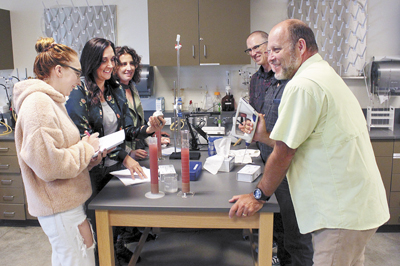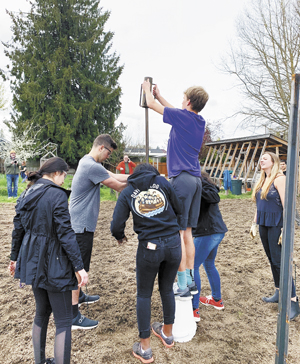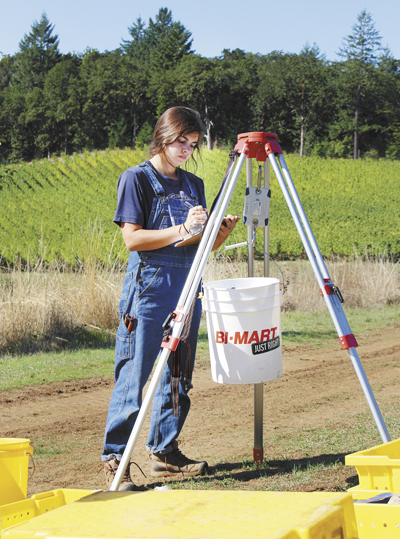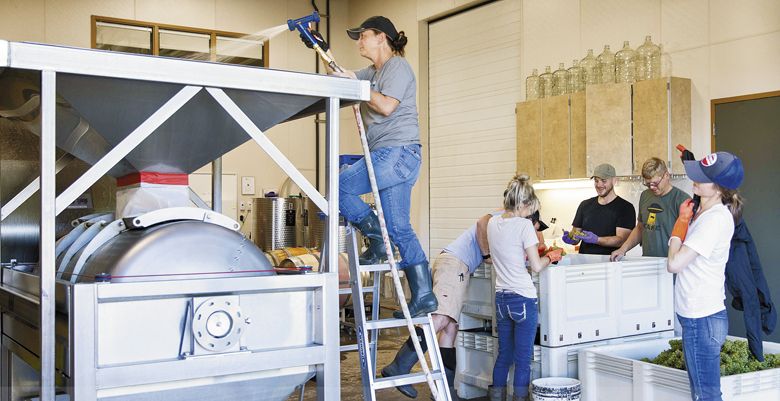Crush Course
Oregon abounds in wine education opportunities
If you want to study winemaking or viticulture and live in Oregon, consider yourself lucky. A number of colleges have created superlative programs, in-depth studies, as well classes for the curious.
Two community colleges, Umpqua Community College in Roseburg and Chemeketa Community College in Salem, showcase reasonably priced educational opportunities for practical experience in making wine and caring for a vineyard. Students can earn an associate’s degree in about two years or one-year certificates in enology, viticulture and wine hospitality.

Umpqua Community College
The Southern Oregon Wine Institute at Umpqua Community College delivers pragmatic education from day one. Most course work is completed online with two full days each month spent in the school’s vineyard and winery, or in the wineries and vineyards of educational partners like Chris Graves with Naumes Crush & Fermentation in Medford or in the Applegate Valley with Jason Cole of Pacific Vineyard Services.
“Students learn traditional methods and have the opportunity to work with advanced technologies,” explained Andy Swan, SOWI director. “We have a cross-flow filter, optical sorting equipment, all the common types of cap management equipment, including Pulsair as well as méthode Champenoise and Charmat methods for producing sparkling wine. The learning environment mirrors the earning environment quite closely.”
SOWI makes wine at commercial scale from estate grapes and also is a custom crush facility for local growers. The college is unique in encouraging of students to make their own wine and establish their own label, thus UCC has been an incubator of sorts for a number of Umpqua Valley wineries.
UCC’s viticulture and enology degree program requires 96 credit hours; the wine marketing certificate, 20; and the viticulture track, 47.
Chemeketa Community College
The Northwest Wine Studies Institute at Chemeketa Community College offers two associate’s degrees, in winemaking and vineyard management, for 90 credit hours. The program also features certificates in vineyard management and wine hospitality, 36 and 42 credit hours, respectively. Besides quality instruction and class work, practical internships remain a highlight of Chemeketa.
“Every student who graduates in wine studies from Chemeketa has had at least a six-credit internship, and many students will do more because they value that experience,” says Jessica Sandrock, director of agricultural sciences and wine studies. “Partnerships with employers are wonderful.”
The school’s wine hospitality operations certificate prepares students for supervisory positions in tasting rooms. Independent study entails courses from both the hospitality and tourism management and wine studies departments. The wine hospitality certificate also requires a six-credit internship with several on-campus opportunities for experiential learning. NWSI has opened a campus tasting room in Salem, serving the students’ label, Chemeketa Cellars, building a healthy wine club membership.

Linfield College
Linfield College is a private four-year college in McMinnville offering both a wine studies major and minor, and online certificate programs focusing on the marketing and management of wine. The college’s 120-semester credit-hour degree is either a B.A. or B.S. degree depending on academic concentration with 60 semester hours in wine studies for a major.
Linfield’s wine degrees are interdisciplinary programs drawing on faculty and staff from various departments. Greg Jones, director of the Evenstad Center for Wine Education at Linfield College, describes the wine industry as a three-legged stool: viticulture, enology and everything else.
“That third leg is the hardest part of the framework because it’s how you represent a brand, how you market and sell, how you fit it into the broader tourism and hospitality framework,” Jones explained. “What we are trying to do at Linfield is expose students to the framework behind growing grapes and making wine, while allowing them to find their niche within all the other components of the industry.”
For the wine studies major, Linfield College requires students to complete a minor or second major, or an approved study-abroad program.
Oregon State University

Oregon State University houses its wine studies program primarily in the food science and technology, and horticultural departments of the College of Agriculture. The B.S., M.S. and Ph.D. programs are large enough to offer a breadth of courses, research opportunities and internships, but small enough to offer hands-on training, lab work and research experience with intensive contact with faculty. For the B.S. degree, 180 credit hours are required; 45 additional credit hours earns the M.S. degree; and a Ph.D. requires 108 credit hours beyond the baccalaureate.
The food science track of the enology and viticulture option requires credit hours in topics such as food, fermentation, plant and soil sciences, and electives in enology and viticulture. The horticulture track requires credit hours in plant ecology, genetics, irrigation, entomology, plant physiology as well as electives in enology and viticulture. Both options offer students a foundation in the sciences, underpinning the discipline of enology and viticulture as well as specific preparation for careers in the wine industry.
“The viticulture and enology classes are broadly focused on the sciences,” said James Osborne, an OSU wine microbiologist and extension enology specialist. “While the fundamentals of grape growing or winemaking are universally very similar, we frequently use examples in our teaching and research that emphasize the unique aspects of the Oregon wine industry.
OSU faculty also delivers workshops and seminars around the state through county research and extension programs.
Among the more than 20 OSU faculty and staff engaged in grape and wine research are Alex Levin who focuses his work on vine water stress; Laurent Deluc studies grape genomics; Patty Skinkis examines whole plant physiology; Achala KC studies plant pathology; James Osborne investigates the microbiology of winemaking; and Elizabeth Tomasino teaches sensory evaluation.
Southern Oregon University
Located in the heart of Southern Oregon’s wine country, Southern Oregon University currently offers a wine business certificate, requiring 28 credits — some prerequisites may be needed — on the quarter system.
“A lot of the players in the Valley are struggling to find dedicated and qualified workers and also to find seasonal workers,” remarked Joan McBee, chair of the School of Business. “The wineries are very interested in hiring our students as interns or right after graduation — it’s 100% employment for our graduates.”
Other Factors
School tuition and fees can be overwhelming, but all academic programs presented in this story offer financial aid and scholarships, lowering the sticker price for an advanced degree. Distance from campus may be another deterrent, but most programs offer some courses online or on location, and most include some accommodation for working students.











